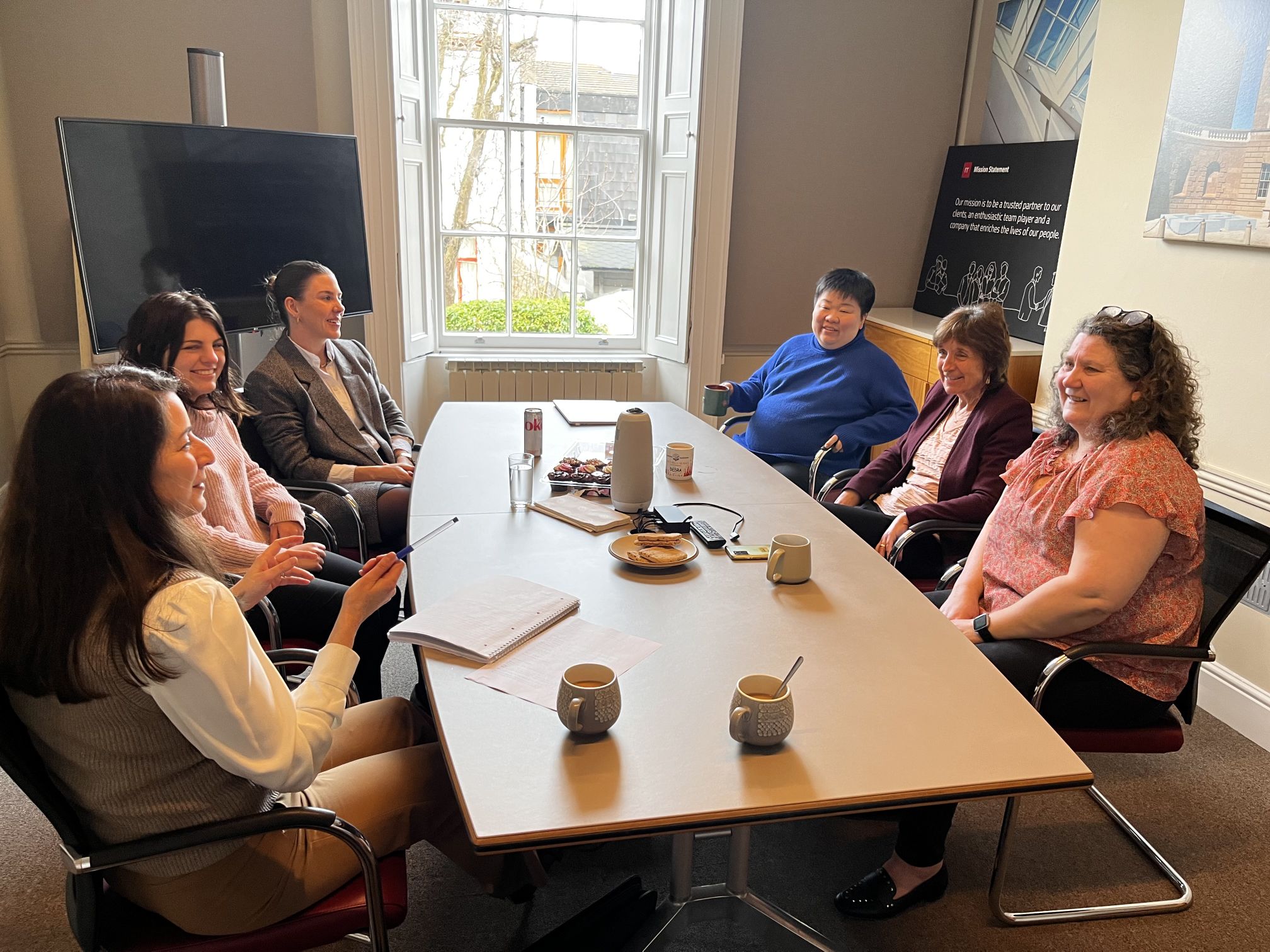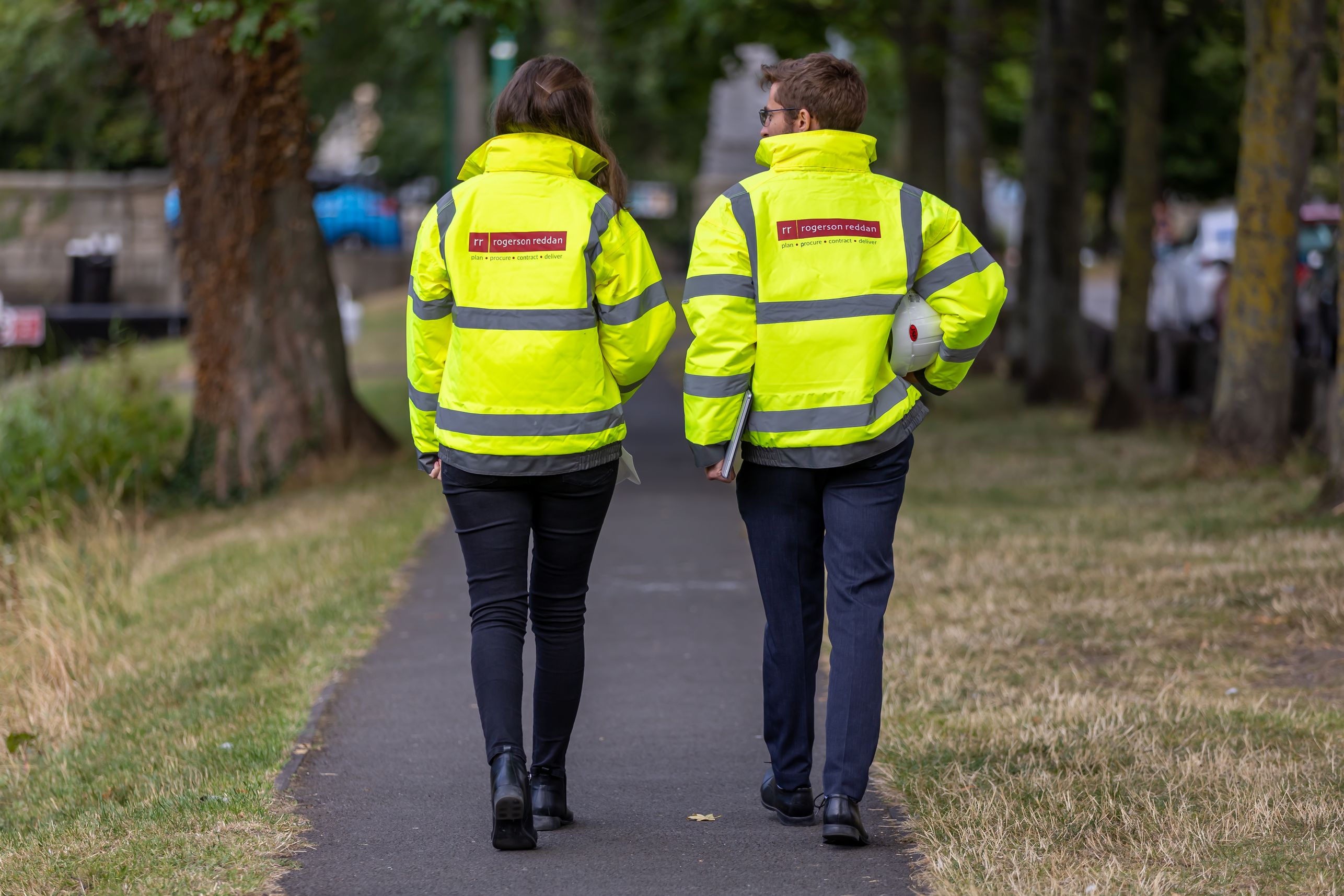To mark International Women’s Day 2024, five female members of Rogerson Reddan’s team gathered to share their pathways to the profession, their career journeys, and their experiences in what has traditionally been a male-dominated industry.
We also felt it was appropriate to acknowledge the evolution in the company over recent years that has redressed the gender balance significantly. Today, women account for 26% of the team at Rogerson Reddan, across Project Management, Quantity Surveying and administrative roles. And the number is rising: since 2022, 43% of our new hires are female. This progress over the past two years is above the industry average, where 7% of people working in the construction industry are women, according to the latest CSO Labour Force data.
We were delighted that Meabh Smith, communications director of the Construction Industry Federation, agreed to chair the discussion at our offices. Her positive energy set the tone for an engaging and wide-ranging discussion involving Aisling Burke, Project Manager; Amore Gerber, Cost Manager; Dan Jin, Senior Cost Manager; Maeve Grogan, Financial Controller; and Patricia Barrett, Senior Chartered Project manager.

The RR Team sit down with Meabh Smith
Unique stories and diverse career paths
Their stories are unique, and they show there are many ways into the industry that don’t necessarily follow a predetermined path. For example, Patricia was originally a hairdresser and then housewife; when her son was choosing his third level options, at a TU Dublin open evening, it was suggested that she could follow a similar route and she studied to become a chartered surveyor.
Dan Jin relocated from China when she was 16 years old and sat her Leaving Certificate in Ireland. She qualified from university as a building systems engineer and worked in car plants and pharmaceutical factories before turning to QS.
Amore Gerber is the latest recruit to Rogerson Reddan, having moved from her native South Africa to join in January 2024 after studying architecture, followed by Quantity Surveying. Her college professor knew of the company and spoke highly of it, and she was attracted by the projects she would get to work on.
As financial controller, Maeve Grogan might not find herself on many construction sites but that hasn’t stopped her from playing a strategic role in the business. Having originally started working part-time at Rogerson Reddan in 2008, her remit expanded from bookkeeping to cover financial reporting and profitability analysis. She also put in place a project management system that allowed company members to record their time and expenses incurred – a critical tool in an industry where time is money.
Aisling Burke came from a science and engineering family but happened to graduate in civil engineering just as the economic downturn hit in 2010. She retrained as a teacher and always strived to pass her passion for engineering on to her students, especially girls.
Patricia remembered her own time in school, when girls were denied many opportunities to explore careers like this. “There was only home economics; there wasn’t technical drawing or woodwork.” Aisling agreed, saying that she had to study Applied Maths at the weekends outside her all-girls secondary school because it didn’t offer the subject and she found there was a definite push into more traditional jobs for women.
The importance of role models
This is where role models play such a crucial part in encouraging young women to keep up STEM subjects throughout their formative years of school. Aisling spoke about her Maths teacher who inspired her by presenting the subject as a set of problems applicable to real life. “She inspired me to be the best I could be at anything I wanted to be,” Aisling said.
Having supportive parents and family members also helps to break down gender barriers associated with certain jobs. Aisling’s father is a civil engineer, and her mother is an information librarian with a degree in Maths and Economics. “There was no talk in our house of girls not being good at Maths or STEM or of them being difficult subjects,” she recalled.
Patricia’s late husband was a carpenter and as her son and daughter started showing an interest in construction and engineering, that naturally flowed into family discussions at home.
As one of only two women in her class when she started, Patricia found this worked in her favour as someone returning to study. “I got great support, because they saw that you were there to learn. You weren't like someone fresh out of school that was told by their parents: ‘you have to go to college’. I chose to be there. So they were prepared to help you. And not to use it as an advantage, but I was a woman so I could push them a little bit more and if I wasn't sure of something I'd ask and they’d happily tell me.”

The reality of women working in construction
Although the construction industry might seem intimidating from the outside, there’s a friendly atmosphere within the community – a sentiment that got lots of agreement around the table. As one of the longest standing female staffers at Rogerson Reddan, Maeve Grogan has seen growing diversity in the company and the industry as a whole. “At one stage, there were only two female Quantity Surveyors along with two female support staff in Rogerson Reddan. But now, there's more and more females coming in, which is great. I think it adds to the company: I'm a great believer that females bring a different perspective,” she said
As more women join the industry, they also provide a pathway for others. When women see themselves represented in the sector, it becomes easier for others to picture themselves in similar roles.
Varied career options in construction
Meabh Smith shared her perspective as a communications professional and spoke about the CIF’s work in promoting careers for women in construction. There are varied roles that don’t have to involve hard hats and boots on a cold and muddy building site, from health and safety to project management, consultancy, design and engineering.
Maeve Grogan agreed, noting how "Female participation in the industry is growing, “which to my mind does make it more attractive to females. And there’s nothing about the industry that should put off a female: it’s an interesting, varied career with lots of avenues you can go down,” she said
Dan Jin feels the industry is more welcoming to women than it’s sometimes given credit for. “For most women, it’s not a difficult industry to work in. I find that it’s actually quite easy. As a female, there’s no difference. People are quite simple: once the job is done, the job is done. They’re not looking at you and judging because you’re a woman. It’s what you bring to the job.”
It’s an industry that calls for updating knowledge, and the women’s experience at Rogerson Reddan is of a culture that promotes opportunities for career progression and encourages continuous learning in areas that both enhance their own career development and augment the service. “Not only for females but for males as well, a lot are doing continuing studies or part-time studies. They’re doing different subjects relating to the job: some people are doing renovation of historical buildings, for example. And people like me, who switched from another sector to doing quantity surveying,” Dan said.
An inclusive culture
When deciding where to work. Amore Gerber was first attracted by Rogerson Reddan’s values and when researching the company online, she found the mission statement “to be a trusted partner to our clients, an enthusiastic team player and a company that enriches the lives of our people”. She said: “I feel like, that's a great slogan, but actually, they live by it – which is something that you don't often see, it’s not just words on a page.”
Now settling in to her role, she enjoys the lack of hierarchy and helpful culture. Amore was speaking about her experience at Rogerson Reddan, but it’s just as applicable to women looking to find a way into the construction industry.
“I saw it as the opportunity of a lifetime to come here and work for this company. I was very excited about it. I didn't really have the apprehension that I think a lot of people probably have. I firmly believe, everything will work out, you'll end up where you need to be.”
